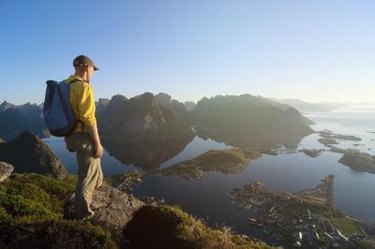
A high altitude brings with it beautiful scenery and what feels like thinner air. You may be on vacation at a high altitude or be participating in rock climbing or hiking and find you are struggling for breath. Your body increases your respiration rate in an effort to bring in more oxygen. You can perform a few breathing techniques to work with your lungs and not against them.
Oxygen
Video of the Day
In "Exercising into Thin Air," Karp indicates that the reason you have difficulty breathing at high altitudes is that the barometric pressure decreases as you ascend. This results in less oxygen entering your lungs as you breathe. The oxygen level in the air does not change. Air contains 20.93 percent oxygen regardless of where you are standing on earth. It is the barometric pressure that causes the change as oxygen enters your body.
Video of the Day
Deep Breathing
One way to compensate for a decreased intake of oxygen at high altitudes is to slow down your breathing rate, but increase the depth of your breaths. Instead of breathing quick, shallow and only in your lungs, breathe slow, deep and inhale until your stomach expands. As your activity increases and your breathing rate speeds, increase the frequency of your breaths, but keep the inhales deep and concentrated.
Pressure Breathing
A technique to increase the amount of carbon dioxide as you exhale is to purse your lips and forcefully exhale. In "Ten Non-Medicated Ways to Cope with Altitude," C.W. Shurman writes that this technique may allow for an easier oxygen exchange in your lungs. Shurman also suggests slowing your pace in an effort to slow your breathing to a level that will allow you to continue your exercise with consistency, instead of pausing to breathe. The goal is to avoid overexertion.
Time
If you are competing at high altitudes, IDEA Fitness Journal recommends training at the desired altitude for two weeks prior to your event. If this is not possible, you should try to arrive as close as possible to the day of the event. Your body's response to altitude has the most effect on your performance after 10 to 14 days at elevation.
Is this an emergency? If you are experiencing serious medical symptoms, please see the National Library of Medicine’s list of signs you need emergency medical attention or call 911.